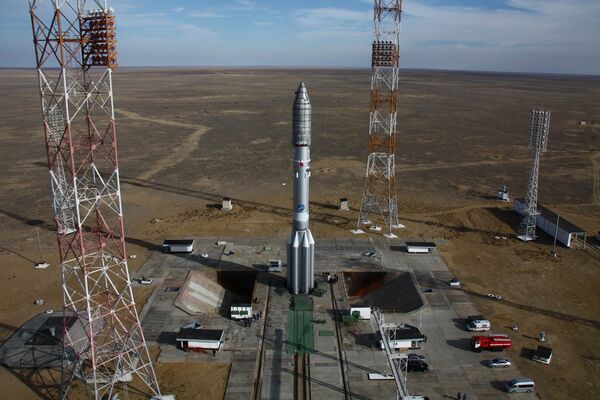MOSCOW, May 16 (RIA Novosti) – The upper stage of a Russian Proton-M rocket suffered an unknown failure after launching from the Baikonur space center in Kazakhstan early on Friday, failing to send what would have been the nation's most powerful and advanced satellite into orbit, a representative of the Russian space agency told RIA Novosti.
Irina Zubareva, a spokeswoman for Russia’s space agency Roscosmos, said an unspecified failure took place during third stage flight and "the Express-AM4R satellite was not put into orbit."
“Members of a state commission are currently analyzing telemetry data in order to figure out the reasons of the unspecified failure,” she said.
The incident occurred in the upper atmosphere on the 540th second of the flight, with the third stage falling 40 seconds short of reaching the desired orbit. The rocket’s whereabouts remain unknown.
A source told RIA Novosti that the rocket fell outside Kazakhstan, possibly in Russia’s south Siberian Altai region or in the Pacific Ocean. There have been no reports of casualties or sightings of the rocket debris.
A commission will be set up to investigate the causes of the crash and other planned Proton launches will be suspended pending the investigation, the source added.
The Russian Satellite Communications Company ordered Express-AM4R from European maker EADS Astrium, an aerospace subsidiary of the European Aeronautic Defense and Space Company (EADS).
The satellite was the third Express launched this year, Express-AT1 and Express-AT were successfully placed into orbit by a Proton launch.
The Proton is the largest rocket in Russia’s fleet of space launch vehicles, and is the workhouse heavy rocket of the Russian space program. Since its first launch in 2001, the rocket has played a crucial role in the development of the Glonass navigation satellite system, and in Express satellite launches, which provide satellite communications for all Russian regions.
In July, a Proton rocket crashed shortly after liftoff showering the surrounding countryside with 600 tons of flaming propellants.
Launches of the Proton were suspended for three months following the accident and Kazakhstan and Russia quarreled over the nearly $90 million clean-up bill.


